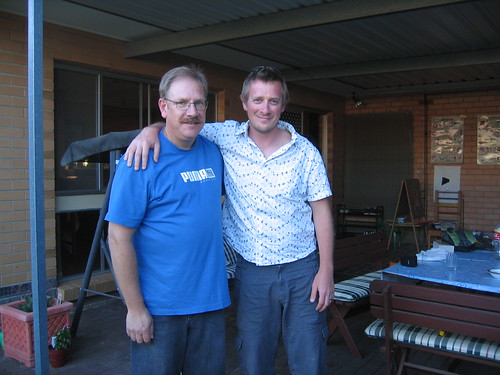There's one week left with one of the best classes that I've taught in my twenty plus years of teaching before the 2008 school year is done and dusted. We are trying to tidy up incomplete work, organise our end of year celebrations and wind up any other unfinished business. This is as good a time as any to look back at my student blogging program and get a few thoughts and observations done while it is still fresh in my mind.
Although I have had a blog of my own for over three years, this was the first year that I felt I had enough confidence to move forward from a single class blog to individual student blogs. Doing it right and making sure that I had the right purpose for this digital tool was foremost in my mind, but with the Gmail multiple sign on and a core group of students who has worked well on our 2007 Spin The Globe wiki project, it was time to get things rolling. The students did not take long to work out the technical details and we used it as a digital journal to try and get into the habit of writing.
I explicitly demonstrated specific processes on our interactive whiteboard to ensure that all students had a starting point for how to embed an image or create a text link. Although it wasn't done often enough, I also used our class blog to create demonstration posts focussed on aspects of our classroom learning. This gave the students a structure to follow and often these posts gave me valuable assessment information about the student's understanding of a particular concept. On some occasions, I showed individuals certain technical solutions for something they wanted to achieve but always on the understanding that they were then reponsible for teaching others who were interested. This might have been learning to embed a slideshow or video, showing some commenting etiquette or even to add a Clustr Map.
All comments were moderated which gave me a regular nightly task. It was important to talk to the kids about "raising the bar" in their comments so every time one of the kids contributed something of value, I threw it up on the IWB and pointed out the merits of effective commenting. Several of my students became very adept at this part of our program, generously giving feedback and encouragement which in turn fueled an increase in blogging quality. One student, KT08, contributed over 100 comments to our little learning community. I asked her one day about her prowess and she said that she actually reads every post from every student in our class.
"I get so many good ideas from reading everyone's blogs," she said.
And I have still to show her how to set up a RSS reader!
Quite a few others got into the idea of using their blog as a personal writing space. I had emphasised good etiquette, sensible protection of their identity and a focus on their own learning - and the kids were taking that all in their stride. One student, Pavlo, developed an excellent blog where he covered a wide array of topics ranging from video games, online worlds, weekends fishing to reporting on class excursions. Others then "raised the bar" on their own writing after reading his posts. Some kids who would do the bare minimum on paper would freely add much more of their own accord. Spelling and punctuation gradually improved as the students realised that others were watching and reading.
Only a very small number of parents left comments during the year. I suppose that like many adults, putting your own words in such a public domain can be somewhat intimidating.
I was very careful not to just do blogging for blogging's sake. It was a vehicle for cybersafety, for creative writing, a repository of student work and technology skills. We had a major push with it as a tool for learning during this last term when we tackled our inquiry unit "What Makes Us Australian?" I appealed to my Personal Learning Network to give students feedback and that generated a lot of discussion back in the classroom as the unit progressed. Thanks again to those connected international educators who generously contributed to my students.
We summarised our achievements with our LA20 Student Blog Awards (affectionately known as the Blogies) which we unveiled in an Upper Primary assembly. Ironically, we ended up with an actual nomination in the Edublog Awards.
As a Year Six class, my students have one more year of primary school to go and my plans are get them to continue with their individual blogs for 2009. I will work closely with their Year Seven teachers and bring the other students from other 08 classes into the fold - and have this useful digital tool as part of the learning toolkit.







 Maths teacher,
Maths teacher, 


 and experience the first hand action. We can take those words and use them to guide our own actions, to provide us with experiences and case studies and to help form professional and personal relationships with others in totally different spheres of learning. D'Arcy (and many others) help me with all of the above and more often than not put a smile on my face when I need it most. Where else would I have encountered the term "borked" if not for D'Arcy and his "outboard brain".
and experience the first hand action. We can take those words and use them to guide our own actions, to provide us with experiences and case studies and to help form professional and personal relationships with others in totally different spheres of learning. D'Arcy (and many others) help me with all of the above and more often than not put a smile on my face when I need it most. Where else would I have encountered the term "borked" if not for D'Arcy and his "outboard brain".